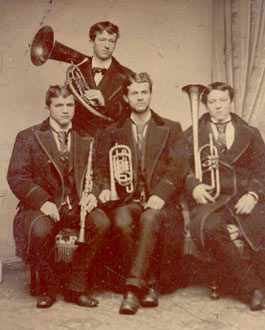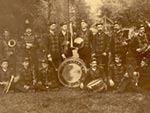TOWN BANDS-- MORE
In the decades following the Civil War, community bands increased as instruments became less expensive and people had more leisure time. Joining a band offered the opportunity to enjoy playing music with others, gain the admiration of friends and neighbors, and have fun socializing during practices and performances. By the 1880s and 1890s, nearly every community had a band.
Thousands of amateur musicians devoted hours of their leisure time and a considerable amount of their spare cash to their musical interests. One of the these musicians was John Hammer, a member of Detroit retailer J.L. Hudson's Military Band during the late 1870s and 1880s. Like other amateur musicians, Hammer had a "day job." He worked for a molding and picture frame manufacturer. In his leisure time, Hammer indulged his musical interests by playing the helicon (an early form of the tuba) with the other amateur musicians--including his three brothers--who played in Hudson's band.
If you visit Greenfield Village, be sure to visit the "Sounds of America" gallery in Greenfield Village. Here you can see and hear the kinds of musical instruments Americans played, and experience some of the ways Americans enjoyed making and sharing music together.

-- Jeanine Head Miller, Curator of Domestic Life, Leisure & Entertainment
|
|
|



